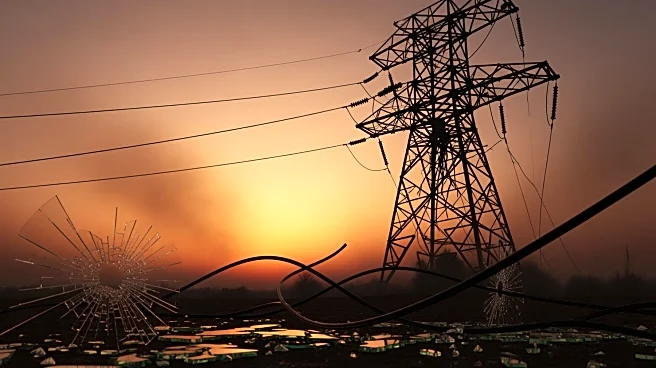What is the story about?
What's Happening?
Saudi Arabia and Pakistan have formalized a mutual defense pact, marking a significant shift in regional security dynamics. The agreement, which builds on decades of informal military cooperation, commits both nations to respond collectively to threats against either country. This pact includes the establishment of permanent coordination mechanisms such as a joint military committee, intelligence-sharing arrangements, and expanded training programs. The timing of the agreement is notable, coming shortly after Israel's bombing of Qatar and amid doubts over U.S. security guarantees to Gulf monarchies. Saudi Arabia, facing threats from Iran-backed Houthis and regional instability, is diversifying its security alliances, with Pakistan offering military manpower and seeking financial support to stabilize its economy.
Why It's Important?
The Saudi-Pakistan defense pact has significant implications for regional security and geopolitical alliances. For Saudi Arabia, the agreement provides a hedge against vulnerabilities such as Iranian missile strikes and Houthi drone attacks, especially as U.S. reliability in the region is questioned. Pakistan, in turn, gains financial support crucial for its economy. The pact could alter the balance of power in West Asia, potentially affecting India's influence in the region. India has invested heavily in its relationship with Saudi Arabia, but the new alliance may challenge its strategic interests, particularly given India's pro-Israel tilt. The agreement signals a broader structural shift, with regional powers recalibrating their security strategies as U.S. dominance wanes.
What's Next?
The defense pact may lead to increased military cooperation between Saudi Arabia and Pakistan, potentially involving joint exercises and further intelligence sharing. However, the agreement also poses risks, as Pakistan could be drawn into Saudi Arabia's regional rivalries, including conflicts with Iran and Yemen. For Saudi Arabia, the pact may complicate its relations with South Asian countries, particularly if tensions between India and Pakistan escalate. The broader regional security landscape is likely to continue evolving, with Gulf monarchies diversifying their alliances and potentially reducing sensitivity to India's concerns. The U.S. and Israel may need to reassess their strategies in the region as Saudi Arabia signals its intent to diversify security partnerships.
Beyond the Headlines
The Saudi-Pakistan defense pact highlights the shifting geopolitical landscape in West Asia, where traditional security arrangements are being reconfigured. The agreement underscores the diminishing influence of the U.S. in the region, as Gulf states seek alternative security partners. This development may lead to long-term shifts in regional alliances, with countries like India needing to adapt their foreign policy strategies to maintain influence. The pact also raises ethical and legal questions about the implications of military cooperation between nations with complex regional rivalries, potentially affecting civilian populations and regional stability.
















